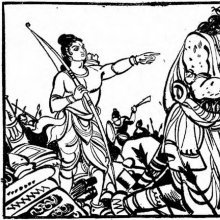War: 4 definitions
Introduction:
War means something in Hinduism, Sanskrit, the history of ancient India, biology. If you want to know the exact meaning, history, etymology or English translation of this term then check out the descriptions on this page. Add your comment or reference to a book if you want to contribute to this summary article.
Images (photo gallery)
(+15 more images available)
In Hinduism
Ayurveda (science of life)
Source: INSA Digital Repository: Caraka’s Approach to KnowledgeWar is one of the contributing factors of a destructive Habitat, that is to be cured by following a righteous code of living, according to the Caraka Samhita Vimāna 3.20-24.—Caraka was probably a witness to wars, plunder, punitive taxation, famine, pestilence, mass evacuation of towns and places and the total collapse of civilized living. He traced these disasters to the greed, corruption and aggression of rulers and the progressive decline in the moral fibre of the entire society. The sovereign prophylaxis and remedy for the destruction of the habitat was the recovery of a righteous code of living. Anything less would fail to prevent ruin and extinction

Āyurveda (आयुर्वेद, ayurveda) is a branch of Indian science dealing with medicine, herbalism, taxology, anatomy, surgery, alchemy and related topics. Traditional practice of Āyurveda in ancient India dates back to at least the first millenium BC. Literature is commonly written in Sanskrit using various poetic metres.
India history and geography
Source: archive.org: Hindu Mathematics (History)Books on the knowledge of War were translated from Sanskrit and transmitted to Arab literature.—The foundations of Arabic literature and science were laid between 750-850 A.D. This was done chiefly with the aid of foreigners and with foreign material. The bulk of their narrative literature came to the Arabs in translation from Persian. Books on the science of war, the knowledge of weapons, the veterinary art, falconry, and the various methods of divination, and some books on medicine were translated from Sanskrit and Persian. They got the exact sciences from Greece and India.

The history of India traces the identification of countries, villages, towns and other regions of India, as well as mythology, zoology, royal dynasties, rulers, tribes, local festivities and traditions and regional languages. Ancient India enjoyed religious freedom and encourages the path of Dharma, a concept common to Buddhism, Hinduism, and Jainism.
Biology (plants and animals)
Source: Google Books: CRC World Dictionary (Regional names)War in India is the name of a plant defined with Ficus benghalensis in various botanical sources. This page contains potential references in Ayurveda, modern medicine, and other folk traditions or local practices It has the synonym Ficus cotoneaefolia Vahl (among others).
Example references for further research on medicinal uses or toxicity (see latin names for full list):
· Species Plantarum
· Enumeratio plantarum (1805)
· Bot. Mat. Med. (1812)
· Ann. Mus. Bot. Lugduno-Batavi (1867)
· Plant Systematics and Evolution (1987)
If you are looking for specific details regarding War, for example extract dosage, health benefits, side effects, chemical composition, diet and recipes, pregnancy safety, have a look at these references.

This sections includes definitions from the five kingdoms of living things: Animals, Plants, Fungi, Protists and Monera. It will include both the official binomial nomenclature (scientific names usually in Latin) as well as regional spellings and variants.
Languages of India and abroad
Nepali dictionary
Source: unoes: Nepali-English DictionaryWaar is another spelling for वार [vāra].—n. 1. that which covers; a cover; 2. a multitude; large number; 3. a heap; quantity; 4. a day of the week; 5. time; turn; 6. an occasion; opportunity; 7. a door; gate; 8. the opposite bank of a river; 9. Mythol. name of Shiva; 10. a vessel for holding spirituous liquor; 11. a blow; 12. an attack; 13. suffix. forms adjectives having the sense of equality; compassion; e.g. छेकवार, रखवार [chekavāra, rakhavāra ] etc.;
Nepali is the primary language of the Nepalese people counting almost 20 million native speakers. The country of Nepal is situated in the Himalaya mountain range to the north of India.
See also (Relevant definitions)
Starts with (+63): War kamasan, War kamasin, Wara, Wara gogu, Wara wara odan, Wara warga, Wara wari, Warabash, Warabi, Warabi-nufuni, Waragama, Waragogu, Waraguwenki, Warai, Warak leikham, Warak-han-chau, Warak-leikham, Warakatiga, Warakuri, Warang.
Ends with (+124): Ab ghaikwar, Akwar, Alvar, Anaswar, Ardhnariswar, Arunacaleshvar, Awar-awar, Badnawar, Ballaleshwar, Bangali bawar, Bara jowar, Bara kanwar, Barajowar, Barakanwar, Barakhawar, Barkachakwar, Baroflawar, Bawar, Bhanwar, Bhatwar.
Full-text (+2744): Sangrama, Virajayantika, Yuddha, Sangramika, Pataha, Ratha, Ayodhana, Samyugina, Samparayika, Simhadhvani, Rana, Simhanada, Samaghata, Samsphota, Samara, Vidarana, Mridha, Kurukshetra, Mahabharata, Abhayadindima.
Relevant text
Search found 290 books and stories containing War, Waar; (plurals include: Wars, Waars). You can also click to the full overview containing English textual excerpts. Below are direct links for the most relevant articles:
War and Literature < [March 1943]
Wars to end Wars < [July – September, 1988]
The Crisis of Civilisation < [April-June 1942]
Temples in and around Madurantakam (by B. Mekala)
Mysore Wars < [Chapter 1 - Historical Backdrop]
Chengalput to the British < [Chapter 1 - Historical Backdrop]
Rise of Feudatories (in Tondaimandalam) < [Chapter 1 - Historical Backdrop]
Nitiprakasika (Critical Analysis) (by S. Anusha)
Preface (Introduction to the Nītiprakāśikā)
War Weapons (1): Śāstras (Introduction) < [Chapter 3]
Weapons and War in Vedas < [Chapter 1]
Puranic encyclopaedia (by Vettam Mani)
Egypt Through The Stereoscope (by James Henry Breasted)
Position 77 - The First Pylon Of Ramses Iii's Great Mortuary Temple At Medient Habu (view North), Thebes < [Standpoints In Egypt]
Position 62 - War Reliefs Of Sethos I, On The North Wall, Outside The Hypostyle Of The Karnak Temple, Thebes < [Standpoints In Egypt]
Position 32 - The Brick Store-chambers Of Pithom, The City Built By Hebrew Bondsmen—looking North < [Standpoints In Egypt]
Warfare and Military System in Vedic Literature (by Rinki Deka)
The Causes of War < [Chapter 4 - Principles and Ethics related to the Warfare]
Marching to War and Seasons < [Chapter 4 - Principles and Ethics related to the Warfare]
Related products
(+2 more products available)











